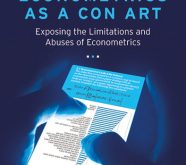Subskrib
Read More »What is ergodicity?
from Lars Syll Time to explain ergodicity … The difference between 100 people going to a casino and one person going to a casino 100 times, i.e. between (path dependent) and conventionally understood probability. The mistake has persisted in economics and psychology since age immemorial. Consider the following thought experiment. First case, one hundred persons go to a Casino, to gamble a certain set amount each and have complimentary gin and tonic … Some may lose, some may win, and we...
Read More »Trump’s fixation on intellectual property rights serves the rich
from Dean Baker Between making threats of actual war with North Korea and Iran, Donald Trump has also gotten us into a trade war with China. Trump’s ostensible reason for this trade war — the large US trade deficit with China — actually did have some basis in reality, but in practice the trade war is straying into turf that is likely to offer few gains for US workers and could actually lead to sizable losses. A major theme in Trump’s campaign was that China is a world-class currency...
Read More »Digital currency: cryptocoin or money-on-account?
from Joseph Huber People have become used to hearing about digital currencies (DC) such as Bitcoin. These currencies are based on new technology known as distributed ledger and blockchain technology and are also referred to as cryptocurrencies because of the data encryption involved. Cryptocurrencies represent a radical alternative to the current banking system, in that they bypass retail banks and defy central-bank control from the outset. Against this background, central banks are now...
Read More »Why economic models do not give us explanations
from Lars Syll Economic models frequently invoke … entities that do not exist, such as perfectly rational agents, perfectly inelastic demand functions, and so on. As economists often defensively point out, other sciences too invoke non-existent entities, such as the frictionless planes of high-school physics. But there is a crucial difference: the false-ontology models of physics and other sciences are empirically constrained. If a physics model leads to successful predictions and...
Read More »The data now used for “testing economic theories” provide no tests at all.
from Salim Rashid It is plausible that economics slipped into its current difficulty because all earlier theory was framed with agriculture in mind. But we are not in an agricultural world anymore. The number of available products must have expanded a 1000-fold since the 1700s. Unless one looks, it is difficult to grasp the sheer amounts of data that are generated and potentially available – but perhaps impossible to digest because of their magnitude and complexity. Below are two...
Read More »“data-free mathematical masturbation”
from Imad Moosa Econometrics is no longer about measurement in economics as it has become too abstract. The word “econometrics” is typically stretched to cover mathematical economics and the word “econometrician” refers to an economist, or otherwise, who is skilled and interested in the application of mathematics, be it mathematical statistics, game theory, topology or measure theory. Baltagi (2002) argues that research in economics and econometrics has been growing more and more abstract...
Read More »Econometrics — a con art with no relevance whatsoever to real world economics
from Lars Syll Econometrics looks “sciency”. Once in a seminar presentation I displayed two equations, one taken from Econometrica and the other from the Journal of Theoretical and Experimental Physics and challenged the audience to tell me which is which. No one volunteered to tell me which is which, including at least one hard-core econometrician. Economics is a social science where the behaviour of decision makers is not governed purely by economic considerations but also by social...
Read More »issue no. 88 of real-world economics review
real-world economics reviewPlease click here to support this open-access journal and the WEASubscribers: 26,499 subscribe RWER Blog ISSN 1755-9472 A journal of the World Economics Association (WEA) 14,432 members, join back issuesIssue no. 88 10 July 2019download whole issue Make-believe empiricism Is econometrics relevant to real world economics?Imad A. Moosa download The fiction of verifiability in economic “science”Salim Rashid ...
Read More »There is no separation between culture and economy.
from Ken Zimmerman There is no separation between culture and economy. They are one another. Historian Richard Hofstadter notes, as have many others that American culture is “…diverse and contradictory” … “visionary and down-to-earth, deeply radical and solidly conservative, coldly prudent and· unexpectedly wild.” As American culture changes, so does American economy. America is Puritanism with its omnipotent God, souls predestined to heaven or hell before birth, and certainty that...
Read More » Real-World Economics Review
Real-World Economics Review




